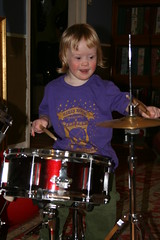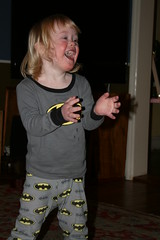I’ve written before about the gendering phenomenon—how eager we are to gender our children, for whom gender, not to mention sex and sexuality, are meaningless, carrying only the meaning that we as skewed, culturally shaped adults bring with us.
My daughter Maybelle, although she has a very gendered first name, does not go through the world as a specifically gendered being. She is equally fascinated with baby dolls and dinosaurs. She loves trains and Willie Nelson’s “Whiskey River” (appropriate for a three year old? Perhaps not, but she does love it). There are many factors that lead to this androgyny of interests: her parents, of course, being fairly radical feminists plays a role. But also I think she doesn’t pick up the gendered cues that her classmates are beginning to perform and observe. Having an intellectual disability is sort of beneficial in that it screens the subtle nuances—nuances that I consider fairly pathological.
Emotions, Maybelle responds to. But the notion that “girls wear dresses, boys play with dinosaurs”? Not so much.
 Adults, however, love some gender distinctions, particularly when little kids are concerned. Many adults who adore Maybelle get tingly at the idea of dressing her in little girl dresses. And here’s the most successful strategy to come along: Maybelle’s preschool teachers have suggested that they’ll have an easier time helping to potty train her if we send her to school in dresses.
Adults, however, love some gender distinctions, particularly when little kids are concerned. Many adults who adore Maybelle get tingly at the idea of dressing her in little girl dresses. And here’s the most successful strategy to come along: Maybelle’s preschool teachers have suggested that they’ll have an easier time helping to potty train her if we send her to school in dresses.
That’s been an effective strategy. We’re very eager for Maybelle to become potty trained, and she seems eager to give it a try, herself. So we’re sending her to school in dresses.
Her dress-wearing was big news. Every person in Maybelle’s preschool—from the director to the undergraduate student workers—have commented on the fact that Maybelle often comes to school these days wearing dresses. My mom, who lives about 500 miles away from us, heard about this fact through a friend of a friend, who found this significant enough that she called my mom up to say, “I hear Maybelle’s wearing dresses!”
A couple of things strike me about this. First of all, if dresses really do make potty training easier, why aren’t the little boys in Maybelle’s class being encouraged to come to school in dresses? And second, it’s interesting how much validation Maybelle gets. “You look so pretty!” adults say to her.
There’s something satisfying to many adults about a girl wearing a dress, and they’re initiating the process that will make this feel satisfying to Maybelle, too. She’ll pick up on the fact that she gets excessive good vibes when she wears a dress. They don’t encourage boys to come to school in dresses for the same reason that they validate Maybelle for wearing one: these are both phenomena related to us creating and perpetuating gender.
Of course she’s adorable in her dresses, but she’s also adorable when she looks a bit like a rock chick, like a comic book fan, like a nerd in her glasses, reading a book. I want her to have a lot of space to develop the personal expression that fits her best, no matter how that maps onto our current configurations of gender.



